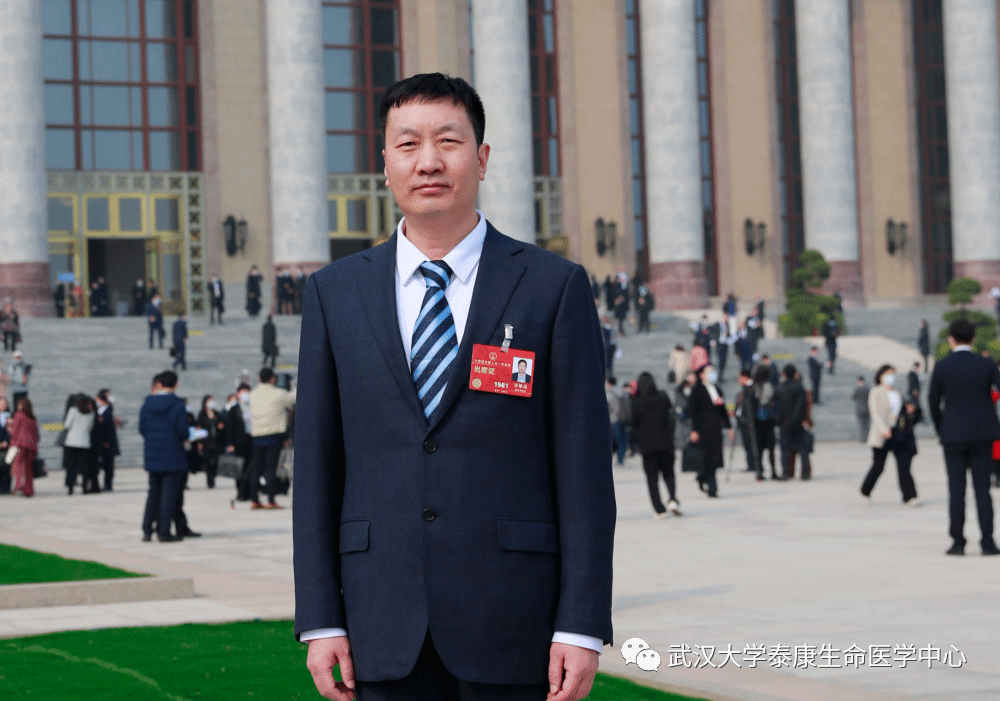"Accelerating the cultivation of top-notch innovative talents in basic disciplines is of great significance." On the morning of March 6th, the Hubei delegation held a group meeting at the first session of the 14th National People's Congress to continue reviewing the government work report. Professor Song Baoliang, deputy to the National People's Congress, academician of the CAS Member, vice president of Wuhan University, president of Taikang Medical College (School of Basic Medicine) of Wuhan University, and director of Taikang Life Medicine Center, proposed at the meeting to accelerate the cultivation of top-notch innovative talents in China's basic disciplines, which received widespread attention and positive response.

Representative Song Baoliang takes a photo at the entrance of the Great Hall of the People.
The government work report mentioned that we will deepen the implementation of the "Strong Foundation Plan" and the plan to cultivate innovative talents in basic disciplines, continue to promote the construction of world-class universities and disciplines, and continuously consolidate the talent foundation for development. These important requirements fully demonstrate the importance of foundational disciplines.
Song Baoliang believes that in the past forty years, China has made great achievements in promoting the cultivation of top-notch innovative talents in basic disciplines. However, there are still five main problems: firstly, there is a shortage and low quality of top-notch innovative talents in basic disciplines, which restricts the development of innovation. The second issue is the lack of continuity in the connection between different stages of cultivating innovative talents in basic disciplines in small, medium, and large universities. The third aspect is that the selection and training mode of top innovative talents in basic disciplines needs to be improved. Fourthly, there is insufficient support for the teaching ecosystem of top innovative talents in basic disciplines. The fifth issue is the lack of extensibility in the development space for cultivating innovative talents in basic disciplines.
In this regard, Song Baoliang put forward five targeted suggestions: firstly, it is suggested that the country formulate the "Outline of the Plan for Cultivating Top Innovative Talents in Basic Disciplines", reasonably plan the scale, structural layout, training path, and condition mechanism guarantee of cultivating top innovative talents in basic disciplines in China in the future period, and provide an action blueprint for truly cultivating a group of top talents capable of supporting innovation in the country. The second is to establish a comprehensive and innovative talent training model for basic disciplines in the entire chain of small, medium, and large integration, linking and coordinating different stages. The third is to improve the selection and evaluation system for top innovative talents in basic disciplines in universities, using "Strong Foundation Plan" and other measures as the starting point, while fully considering educational equity, to open up special admission channels for students with outstanding talents in basic disciplines, "talented" and "eccentric" talents. The fourth is to implement differentiated evaluation of basic subject teachers in universities, highlighting differentiation and long-term assessment, providing fixed teaching funding support, expanding the scope of teaching achievement recognition, increasing the proportion of teaching achievements in teacher assessment content, and taking effective measures to support top innovative talents to carry out systematic scientific research training earlier. The fifth is to expand the employment and development space for top innovative talents in basic disciplines, and solve the export problem of talent cultivation. At the same time, he called for the establishment of a national clinical medical research center at the national level in Hubei.
News source: Li Sihui, Wu Jianglong/China Science Daily
Original link:https://rmtzx.sciencenet.cn/mixmedia/a/202303/08/WS64076282e4b0e8f8ecff5d0f.html